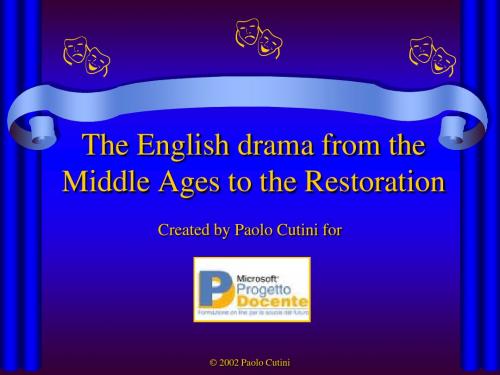English Drama
- 格式:ppt
- 大小:1.94 MB
- 文档页数:81

英语戏剧表演活动内容English Drama PerformanceThe English drama performance was held in the schoolhall on Friday. It was a great success. A large audience of students and teachers attended the show.The drama began with the introduction of the characters, their roles and their relationships. As the play progressed, the audience was captivated by the story unfolding in frontof them. The characters spoke excellent English, making it easy for everyone to follow the plot.The actors delivered the script with such emotion that the audience members were deeply moved. There were several humorous moments as well, providing some light relief amidst the intensity of the story.During the performance, the audience was treated to some beautifully choreographed dance numbers. The dancers had clearly worked hard to perfect their routines, which added more interest to the show.At the end of the performance, the audience gave the actors a standing ovation. Everyone agreed that it had been an enjoyable and entertaining evening. The response from the audience further boosted the morale of the cast and crew, and made the hard work worthwhile.The success of this English drama performance served as an inspiration for all the students. It showed them that with hard work and dedication, anything is possible.。

教材英语戏剧上舞台的英语作文English:English drama has a long history and is an important part of the literature and culture of English-speaking countries. It has a profound influence on the development of world drama. From the early medieval mystery plays to the great works of Shakespeare, to the modern masterpieces of playwrights like Harold Pinter and Tom Stoppard, English drama has continually evolved and thrived.Chinese:英语戏剧具有悠久的历史,是英语国家文学和文化的重要组成部分,对世界戏剧的发展产生了深远影响。
从早期的中世纪神秘剧到莎士比亚的伟大作品,再到像哈罗德·品特和汤姆·斯托帕德这样的现代剧作家的杰作,英语戏剧不断地发展壮大。
English:One of the most important aspects of English drama is its influence on language and literature. Many phrases and expressions from English plays have become part of everyday language, and the worksof playwrights like Shakespeare have had a profound impact on English literature.Chinese:英语戏剧最重要的一个方面是它对语言和文学的影响。



英语戏剧中国故事English Drama: Chinese StoriesEnglish drama has a rich history and diverse range of themes, with one particularly fascinating genre being the incorporation of Chinese stories into theatrical performances. The fusion of English language and Chinese narratives creates a unique and captivating experience for audiences, offering a glimpse into the cultural heritage and traditions of China. Through the lens of English drama, these stories are brought to life on stage, transcending language barriers and connecting people from different backgrounds through the universal language of art.One of the key aspects of incorporating Chinese stories into English drama is the exploration of cultural exchange and cross-cultural understanding. By presenting Chinese narratives in an English-speaking context, playwrights and directors have the opportunity to bridge the gap between Eastern and Western cultures, fostering a sense of mutual respect and appreciation for each other's traditions. This cross-pollination of ideas and perspectives not only enriches the theatrical landscape but also promotes intercultural dialogue and mutual understanding in an increasingly globalized world.Furthermore, the adaptation of Chinese stories into English drama allows for the exploration of universal themes and emotions that resonate with audiences regardless of their cultural background. Whether it's a tale of love and sacrifice, betrayal and redemption, or heroism and tragedy, these stories have the power to evoke deep emotional responses and provoke thought-provoking discussions on the human condition. Through the medium of English drama, these timeless narrativesare given new life and relevance, serving as a mirror to reflect upon our own experiences and values.In addition to cultural exchange and universal themes, the incorporation of Chinese stories in English drama also provides a platform for showcasing the rich tapestry of Chinese folklore, mythology, and history. From ancient legends andfolk tales to historical events and mythical creatures, Chinese stories offer a treasure trove of inspiration for playwrights and directors to draw upon, creating visually stunning and narratively compelling productions that captivate and enthrall audiences. By bringing these stories to the English-speaking stage, a wider audience is able to appreciate and celebrate the beauty and complexity of Chinese culture.Moreover, the collaboration between English-speaking and Chinese artists in the production of these plays not only fosters artistic innovation and creativity but also promotes cultural exchange and mutual learning. Through the sharing of ideas, techniques, and experiences, artists from different backgrounds are able to push the boundaries of traditional storytelling and theatrical conventions, creating groundbreaking works that challenge and inspire audiences. This cross-cultural collaboration not only enriches the theatrical landscape but also promotes a spirit of openness, curiosity, and respect for diverse cultural perspectives.In conclusion, the incorporation of Chinese stories into English drama represents a powerful and transformative fusion of cultures, languages, andartistic expressions. Through the exploration of cultural exchange, universal themes, folklore, and collaboration, these productions offer a window into therich tapestry of Chinese culture while also fostering intercultural dialogue, emotional engagement, and artistic innovation. By embracing the diversity and complexity of Chinese stories in English drama, we not only celebrate our shared humanity but also pave the way for a more inclusive, interconnected, and vibrant theatrical landscape that transcends borders and unites us in our common love for storytelling.。

英语作文英语戏剧大赛English Drama Competition: A Fusion of Creativity and Expression.The English Drama Competition is an exciting event that brings together students from diverse backgrounds to showcase their talent and creativity. This competition not only allows participants to flex their acting muscles but also serves as a platform for them to express their understanding of English literature and drama.The essence of this competition lies in the fusion of words, emotions, and performances. Each participant is required to delve into a script, understand the characters, and bring them to life through their own interpretation. This process requires meticulous planning, dedication, and an immense amount of practice.The preparation phase is crucial. Participants need to familiarize themselves with the script, analyze thecharacters, and work on their lines. They rehearse endlessly, perfecting every nuance of their performance, from the tone of their voice to the subtlest of facial expressions. This phase is not just about memorizing lines; it's about understanding the emotional journey of the character and connecting with them on a deeper level.The competition day is always a thrilling affair. The audience is treated to a series of performances that range from comic to dramatic, each one unique in its own way. The actors bring their characters to life with suchauthenticity that the audience is transported to another world, one that is filled with passion, conflict, and resolution.The judges, who are usually experts in the field of drama and English literature, evaluate each performance based on various criteria such as acting skills, interpretation of the script, and stage presence. They look for performances that are not just technically sound but also emotionally engaging.The English Drama Competition is not just a showcase of talent; it's also an opportunity for students to learn and grow. Through this competition, they learn the importance of teamwork, dedication, and perseverance. They also gain valuable insights into English literature and drama, which helps them appreciate the power of words and stories even more.Moreover, this competition fosters a sense of community among the participants. They support and encourage each other,庆祝彼此的成功,并在挫折中相互扶持。
英专生学习英语戏剧的重要性作文1200字全文共3篇示例,供读者参考篇1The Importance of Studying English Drama for English MajorsEnglish drama is an integral part of the English language and culture. For English majors, studying English drama can bring numerous benefits and enrich their academic experience. In this essay, we will explore the importance of studying English drama for English majors.First and foremost, studying English drama enhances language proficiency. Through reading and analyzing plays, students can improve their vocabulary, grammar, and comprehension skills. They will also become more familiar with idiomatic expressions and literary devices commonly used in drama. By studying the dialogues and monologues of various characters, students can gain a deeper understanding of the English language and its nuances.Furthermore, studying English drama provides valuable insights into English literature and culture. Many great works ofliterature have been adapted into plays, such as Shakespeare's plays and the plays of Tennessee Williams. By studying these plays, students can gain a better understanding of the literary tradition and cultural heritage of English-speaking countries. They can also explore themes such as love, betrayal, power, and morality that are often central to drama.In addition, studying English drama helps students develop critical thinking and analytical skills. Analyzing the plot, themes, characters, and techniques used in a play requires students to think critically and make connections between different elements of the text. By engaging in discussions and writing essays on English drama, students learn how to form and defend arguments, evaluate evidence, and interpret complex texts. These skills are essential for academic success and for navigating the complexities of the modern world.Moreover, studying English drama fosters creativity and imagination. By reading plays and visualizing the characters, settings, and actions on stage, students can expand their imagination and creativity. They can also gain a deeper appreciation for the art of storytelling and the craft of playwrights. Engaging with the imaginative world of Englishdrama can inspire students to think creatively, explore new ideas, and express themselves more effectively in their own writing.Additionally, studying English drama enhances students' empathy and emotional intelligence. Through studying the experiences, emotions, and motivations of characters in plays, students can develop a better understanding of human nature and relationships. They can empathize with characters who are different from themselves, learn to see the world from multiple perspectives, and cultivate a sense of compassion and tolerance. This can help students become more empathetic, respectful, and understanding individuals in their personal and professional lives.In conclusion, studying English drama is a valuable and enriching experience for English majors. It enhances language proficiency, provides insights into literature and culture, develops critical thinking and analytical skills, fosters creativity and imagination, and enhances empathy and emotional intelligence. By studying English drama, students can deepen their understanding of the English language and culture, broaden their intellectual horizons, and cultivate important skills and qualities that will benefit them in their academic and professional pursuits. English drama is not just a subject to bestudied; it is a window into the rich and diverse world of human experience and imagination.篇2The Importance of Studying English Drama for English MajorsAs English majors, it is essential to have a deep understanding of the English language in all its forms. One way to improve our language skills, cultural awareness, and critical thinking abilities is through the study of English drama. English drama has a long and rich history, with roots in ancient Greek and Roman theater but reaching its peak during the Elizabethan era with the works of Shakespeare and his contemporaries. Studying English drama can help us develop a deeper appreciation for the language and its nuances, as well as improve our ability to analyze and interpret texts.First and foremost, studying English drama can enhance our language skills. The language of drama is often more poetic and figurative than everyday speech, making it an excellent tool for improving our vocabulary and understanding of English idioms, metaphors, and other literary devices. By reading and analyzingplays, we can expand our knowledge of the language and learn how to use it effectively in our own writing and communication.Furthermore, studying English drama can help us gain a deeper understanding of the cultural and historical context in which these plays were written. Many English dramas are set in specific time periods or regions, and by studying them, we can learn about the social, political, and economic conditions of the time. For example, Shakespeare's plays often explore themes of power, love, and betrayal, reflecting the political turmoil of16th-century England. By studying these plays, we can gain insight into the values and beliefs of the people who lived during that time.In addition, studying English drama can improve our critical thinking abilities. Analyzing a play involves not only understanding the plot and characters but also interpreting the themes, symbolism, and underlying messages. By engaging with the text in this way, we can develop our analytical skills and learn how to form and defend our own interpretations. This type of critical thinking is essential for success in any field, as it allows us to evaluate information, solve problems, and make informed decisions.Moreover, studying English drama can help us develop our empathy and emotional intelligence. Many plays explore complex human emotions and relationships, allowing us to gain insight into the thoughts and feelings of others. By engaging with characters who are different from ourselves, we can learn to see the world from different perspectives and develop a greater sense of compassion and understanding. This ability to empathize with others is crucial for building strong relationships and navigating the diverse and interconnected world in which we live.In conclusion, studying English drama is essential for English majors who wish to improve their language skills, cultural awareness, critical thinking abilities, and emotional intelligence. By immersing ourselves in the rich tradition of English drama, we can develop a deeper appreciation for the language and its cultural significance, as well as enhance our ability to analyze and interpret texts. Through the study of English drama, we can become more well-rounded individuals and better equipped to navigate the complexities of the modern world.篇3The Importance of English Majors Studying English DramaStudying English drama is an important aspect of a comprehensive education for English majors. The study of English drama offers students the opportunity to explore the history, culture, and language of English-speaking countries in a unique and engaging way. It allows students to develop critical thinking skills, enhance their language proficiency, and gain a deeper understanding of the human experience. In this essay, I will discuss the importance of English majors studying English drama and how it can benefit students in their academic and professional careers.First and foremost, studying English drama provides students with a window into the history and culture ofEnglish-speaking countries. Through the study of plays by playwrights such as William Shakespeare, Tennessee Williams, and Arthur Miller, students can gain a deeper understanding of the social, political, and cultural issues that have shaped these societies. They can also learn about the traditions and values that are important to these societies, and how they have evolved over time. By studying English drama, students can develop a greater appreciation for the cultural heritage of English-speaking countries and gain insight into the complexities of human nature.In addition, studying English drama can help students improve their language proficiency and literary analysis skills. Reading and analyzing plays written in English can help students expand their vocabulary, improve their grammar and syntax, and enhance their ability to express themselves fluently and confidently in written and spoken English. By studying the dialogue, themes, and characters in English drama, students can also develop their ability to analyze and interpret complex texts, identify literary devices and techniques, and appreciate the nuances of language and communication. These skills are essential for success in academic writing, literary analysis, and critical thinking, and can benefit students in a wide range of academic and professional contexts.Furthermore, studying English drama can help students develop empathy, creativity, and emotional intelligence. By immersing themselves in the stories and characters of plays, students can gain a deeper understanding of the human experience and learn to see the world from different perspectives. They can develop empathy for characters who face challenges, conflicts, and struggles, and learn to appreciate the complexities of human relationships, emotions, and motivations. By studying English drama, students can also cultivate their creativity and imagination, as they explore the ways in which playwrights uselanguage, symbolism, and dramatic techniques to create compelling narratives and engaging performances. By engaging with the emotions, conflicts, and dilemmas of characters in plays, students can develop their emotional intelligence and learn to navigate the complexities of human interactions and relationships.In conclusion, studying English drama is an important and valuable aspect of a comprehensive education for English majors. It offers students the opportunity to explore the history, culture, and language of English-speaking countries in a unique and engaging way, while also developing their critical thinking skills, language proficiency, and understanding of the human experience. By studying English drama, students can gain insight into the social, political, and cultural issues that have shaped English-speaking societies, improve their language proficiency and literary analysis skills, and develop empathy, creativity, and emotional intelligence. These skills are essential for success in academic and professional contexts, and can benefit students in a wide range of career paths and life pursuits. Therefore, English majors should consider studying English drama as a valuable and rewarding complement to their studies in language, literature, and culture.。
英语戏剧表演英语作文The world of English drama offers an expansive canvasfor actors and audiences alike. From the grand stages of Shakespearean theater to the cutting-edge plays of the modern era, English drama has evolved and expanded over the centuries to encompass a broad range of styles and genres. This essay will explore the various elements that make English drama so captivating, as well as the benefits of participating in or witnessing an English drama performance.The Historical Depth of English Drama。
One of the most remarkable aspects of English drama is its rich history. Beginning with medieval mystery plays and morality plays, English drama has its roots in religiousand moral storytelling. These performances were originally intended to convey moral lessons to the masses, often with humorous elements to keep audiences entertained.As drama evolved, the Renaissance period brought us theworks of William Shakespeare and his contemporaries. This era marked a significant shift towards more complex characters and plots, exploring themes such as ambition, love, betrayal, and the human condition. Shakespeare's influence on the English language and dramatic tradition cannot be overstated, as his plays continue to be performed worldwide and have had a lasting impact on literature and theater.The 18th and 19th centuries saw the rise of different theatrical forms such as comedy of manners, melodrama, and realism. Each of these genres brought a unique perspective on society, often challenging prevailing norms and values.The Diversity of Modern English Drama。